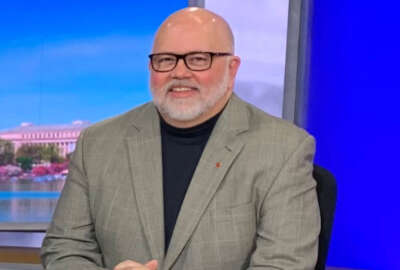
Why judicial branch employees sued over a rule on political activity
The Hatch Act prohibits political activities by federal employees on the job. It only applies though to executive branch agencies. When the head of the...
Best listening experience is on Chrome, Firefox or Safari. Subscribe to Federal Drive’s daily audio interviews on Apple Podcasts or PodcastOne.
The Hatch Act prohibits political activities by federal employees on the job. It only applies though to executive branch agencies. When the head of the Administrative Office of the U.S. courts enacted new rules for that agency’s employees that went even further than the Hatch Act, not everyone was on board. Two employees filed a lawsuit. On the Federal Drive with Tom Temin, Federal News Network’s Eric White spoke with one of the attorneys involved. He’s legal director for the D.C. Chapter of the American Civil Liberties Union, Art Spitzer.
Interview transcript:
Arthur Spitzer: It’s an agency of about 1100 employees, part of the judicial branch of government. And so it’s not covered by the Hatch Act, which covers hundreds of 1000s or millions of executive branch employees around the country. So the judiciary has its own rules about political activity. It has some very strict rules that apply to judges themselves and their law clerks who assist them in citing cases. But these employees of the administrative office who mostly perform back office kinds of work, they helped with the judiciary, with its technology, with its budget, with its building plans, all kinds of stuff like that. They had a fairly or relatively relaxed set of rules about political participation that was more or less similar to the Hatch Act. But in 2018, a new director of the administrative office decided that there ought to be stricter rules, and in a whole variety of ways, and I’ll talk about that in a moment, but one employee of the administrative office, a lawyer there who had been there since 2010, and was a Navy veteran and had had previous government jobs where she was subject to the Hatch Act, and had no complaints about that. She got in touch with us. And she said, “Here are these new rules that will prohibit me from doing things I’ve been doing for many years as a government employee, and I think it’s wrong”. Someone else eventually joined with her. So the plaintiffs names are Lisa Guffey and Christine Smith, who’s an IT expert, and who have previously worked for years at a very high level in the Department of Defense, doing IT work with a top secret clearance and subject to the Hatch Act, also joined as a plaintiff because she was now being told she couldn’t do things that she had always been able to do.
Eric White: So there are two employees that have, like you said, very familiar with the Hatch Act, they know where the appropriate level of political participation and where the lines probably should be drawn, even if the Hatch Act doesn’t apply to them. So what kinds of political activities was this new code of conduct prohibiting administrative court employees from participating in?
Arthur Spitzer: Right, so there were nine categories. And I’ll just run through them number one was expressing political opinions in public including on social media or in letters to the editor. Number two was wearing political buttons or displaying signs on like on your front lawn or your bumper sticker on your car. Number three was driving voters to the polls on behalf of a party or a candidate. Number four was contributing funds, no matter how small, any amount, to a political party or candidate or action committee. Number five was attending partisan fundraisers. Number six was being a member of a political organization other than just registering as a member of a party so you could vote in the primary. Number seven was attending events for partisan candidates for office. So if you just wanted to go hear candidate speak at a public event, you couldn’t do that. Number eight was organizing events for a partisan candidate. And number nine was attending party conventions or rallies or meetings. So really, it pretty much covered the waterfront, there was hardly anything you could do other than vote. So we filed this case in May of 2018. We got a preliminary injunction from the district judge, and then continued litigating the case to a final decision in April of 2020. And the judge ruled that seven of those nine categories were improper, and issued an injunction allowing all employees at the administrative office to engage in them. The two where he felt the government had made a reasonable case to prohibit were driving voters to the polls on behalf of a party or a partisan candidate because he said someone might see you doing that and realize that you were engaged in a partisan activity. and organizing events. Similarly, if you were the organizer of an event, he thought maybe that went too far. So that was his decision. The government appealed. They were not happy with that and as it went to the court of appeals, which as you point out, decided last week. Decided it on August 16. It was a panel of three judges. The opinion was written by Judge Walker who’s actually a Trump appointee. We were glad to see that he agreed with us in this case, and the court of appeals struck down all nine, they didn’t see any significant difference between them. They said the administrative office didn’t have a valid reason for prohibiting any of these activities. Their reasons are all based on speculation about what people might think if they number one, knew that these people were employees of the administrative office of the courts. If they even knew what the administrative office of the courts is, because most people never heard of it. How would they know that someone who they saw at a rally, or someone whose house had a lawn sign in front was an employee of the administrative office. So it was all just speculative, said the court of appeals, and struck them all down. They did, for technical reasons, limit the injunction to the two plaintiffs. So strictly speaking, only our two plaintiffs are now free to do all these things. Now, the administrative office has several choices at this point, they could ask the entire court, rather than just a panel of three judges, they can ask the whole court to rehear the case, that’s one possibility. They could ask the Supreme Court to review the case. That’s another possibility. We’re hoping they won’t do either of those things. But they’ve got 45 days to seek rehearing. They’ve got 90 days to ask the Supreme Court to review. So we won’t really know till more or less the end of the year. And they could say, all right, Miss Guffey and Miss Smith, you can do what you want. And the other 1099 more or less, still have to obey the old rules, in which case, we’d have to bring a new lawsuit. And presumably we’d bring it as a class action. But we are optimistic that they’ll accept this decision, and that they’ll agree that the same rules should apply to all of their employees. With the exception, there’s a small category of the very top level of supervisors at the administrative office, that have that are a different category and have different rules. And we didn’t challenge the rules as to those, I think six top employees.
Eric White: Yeah, I’m curious if the judges, you mentioned that they just threw out those nine rules. Did they mention anything about the actual authority of the uppers that you just mentioned that the Administrative Court of the United States? Do they have the authority to do this to their employees? Did the judges mentioned anything about that? You know, can they could they issue other rules that they wanted to?
Arthur Spitzer: They could and we haven’t challenged that the administrative office can make rules for its employees, they can make rules about, you know, do they have to wear a shirt and tie? Do they have to show up for work at nine o’clock and can they work from home? Any agency I guess has a certain amount of authority to make rules for its employees and there have been rules all along. They’ve just not been so crazy as these. So so we didn’t say you can’t make any rules. We just said you will have to be constitutional. And we thought these crossed the line to being a violation of of the employees rights under the First Amendment.
Tom Temin: Art Spitzer is legal director of the Washington D.C. chapter of the ACLU, speaking with Federal News Network’s Eric White.
Copyright © 2025 Federal News Network. All rights reserved. This website is not intended for users located within the European Economic Area.
Tom Temin is host of the Federal Drive and has been providing insight on federal technology and management issues for more than 30 years.
Follow @tteminWFED
Related Stories





